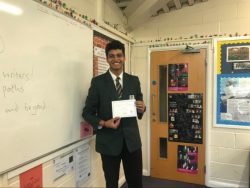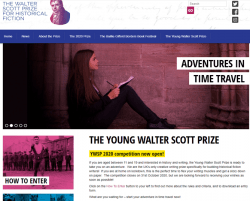Young Writers Award
The Young Writers’ Award is a competition for those between 11 and 18 years of age who have a passion for writing. The participants can write in various forms, for example:...
Filter by Category
Filter by Author



























































































































































































The Young Writers’ Award is a competition for those between 11 and 18 years of age who have a passion for writing. The participants can write in various forms, for example:...
Posted by Lynn Court

‘The Mayor of Casterbridge’ (1886) by Thomas Hardy Arguably Hardy’s greatest work, The Mayor of Casterbridge is the tragic story of Michael Henchard, a man who rises to civic...
Posted by Lynn Court

Wolf Hall’ (2009) by Hilary Mantel Recently recommended as a lockdown read by the Independent, Wolf Hall is historical fiction set in the time of Henry VIII. It follows the king’s...
Posted by Lynn Court

‘Brighton Rock’ (1938) by Graham Greene ‘Heaven was a word: hell was something he could trust.’ This fast-paced thriller is one of Greene’s most famous novels. It tells the tale...
Posted by Lynn Court

Most of us have been having a fair few of those since the lockdown began, both literal and metaphorical. Like many idioms, the origin is uncertain, although it seems to be one of...
Posted by Lynn Court

This week: ‘The Secret History’ (1992) by Donna Tartt The story follows a group of smart, attractive Classics students at an elite university, and an outsider who finds himself...
Posted by Lynn Court

This week: A Short History of Nearly Everything (2003) by Bill Bryson A nonfiction offering: In his quest to provide what the title suggests, Bryson is funny, clear and...
Posted by Lynn Court

‘To Kill a Mockingbird’ (1960) by Harper Lee This Pulitzer Prize winning novel concerns the essential nature of right and wrong and how good and evil can coexist. Through...
Posted by Lynn Court

The English Faculty would like to draw your attention to another writing competition opportunity. This one has longer for you to create your masterpiece:
Posted by Lynn Court

‘Things Fall Apart’ (1958) by Chinua Achebe A worldwide bestseller, Amazon summarises ‘Things Fall Apart,’’ as the compelling story of one man’s battle to protect his...
Posted by Lynn Court
The Young Writers’ Award is a competition for those between 11 and 18 years of age who have a passion for writing. The participants can write in various forms, for example: fiction, poetry, non-fiction, etc. However, there is a twist, the stories must only be a hundred words! Every year, there are several themes explored and we were invited to respond to an SOS saga on the theme of ‘Missing’…
Fortunately, for my English class, our teacher, Ms Court, encouraged and inspired us to take part in this contest in order to build our confidence as young talented writers of Bushey Meads School.
As a class, we spent one and a half days exploring and planning the theme and our mini adventure, before beginning to write them. During this period, we were able to experiment with different narrative viewpoints and language skills to make our stories unique and stand out from our competitors. We also looked at various writing techniques that we could use to really hook the reader into our dramatic short response. Many of these techniques can be used again when we write descriptively for English Language GCSE Paper 1.
Last week, we were told the great news that 16 of the stories we had written were selected from 6,500 entries nationwide and it will be published in the annual collection of anthologies featuring young writers from all around the UK. The book will be named Missing – Future Authors and our names along with our short stories will remain in the National Archives of the British Library forever. We would have never reached this feat if it wasn’t for the team work of the class and our fabulous teacher Ms Court.
Those whose work will be published, received a certificate to mark their effort and an unforgettable bookmark to remind them of their achievement.
Now there is just one thing we cannot wait for – it is the final results for this year’s entries. The top prize for the best piece of writing will receive a £500 voucher and The Young Writers’ Award for Excellence. The four runner-ups won’t leave empty handed… they will be gifted with £250 National Book Tokens. The results will be announced at the end of this year, so do look out for them.
Thank you,
Kavya Mehta